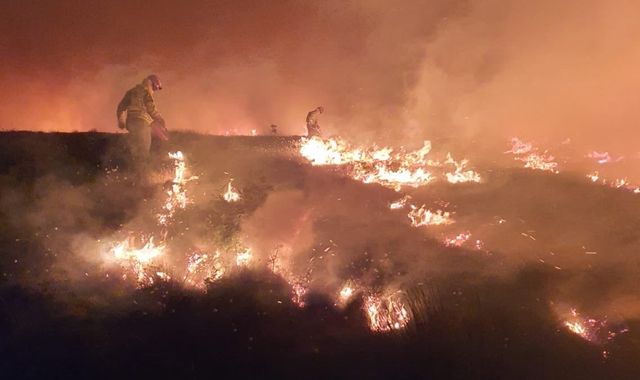UK weather: England records driest ever May as moorland burns in Lancashire
Written by News on 02/06/2020
England has had its driest May on record and the UK had its sunniest calendar month – but there are warnings for those out enjoying the weather after moorland caught fire in Lancashire.


According to Met Office statistics, May 2020 was the sunniest calendar month on record, with 266 hours of sunshine.
It beat June 1957, when there was 265 hours of sun.
The Met Office also said England had its driest May on record – and for Wales it was the second driest.
The heat and lack of rain has created the “perfect” conditions for grass fires, and firefighters are pleading with people to take care.
It has also been the eighth warmest spring on record for the UK, with both England and Wales having their fifth warmest spring on record, while it has been the fifth driest spring for the UK overall.
Dr Mark McCarthy, the head of the Met Office’s National Climate Information Centre, said: “The most remarkable aspect is just how much some of the May and Spring records for these climate statistics have been exceeded.
“Exceeding the UK sunshine record is one thing, but exceeding by over 70 hours is truly exceptional.”
He added: “The sunshine figures for spring would even be extremely unusual for summer and only three summers would beat spring 2020 for sunshine hours.”
Dr McCarthy said the principal reason for the dry and sunny weather is the “extended period of high pressure which has been centred over or close to the UK”.
Last week, water companies said that customers have been turning on the taps more than usual.
South East Water said people doing extra gardening and DIY during the coronavirus lockdown had contributed to an additional 14% being used.
Water UK chief executive Christine McGourty said: “These are exceptional times and the record-breaking dry weather is a powerful reminder of what a precious, natural resource our water is.
“With so many people at home and enjoying their gardens, water companies are seeing record demand for water, which can cause issues with water pressure.”
At the weekend, crowds surged to England’s beaches and beauty spots to soak up the sun.
Forecasters have said temperatures will drop in the second half of this week, with some rain forecast in places – but conditions will continue to remain pleasant for most of the country.
Lockdown restrictions were eased on Monday, with more children returning to school in England and the elderly and most vulnerable able to see loved ones.
It was also a busy day for firefighters in Lancashire, where the hot and dry weather created the “perfect” conditions for flames to engulf areas of moorland.
Two major incidents have been declared in the county – where 120 firefighters are tackling moorland fires that were either deliberately started or caused by discarded BBQs.
Four square-kilometres of land is still burning on Darwen Moor near Blackburn and another major fire is now under control at Longridge Fell, where miles of forest have been destroyed.
Lancashire Chief Fire Officer Justin Johnston told Sky News: “The dry conditions are just perfect for this and very sadly they are entirely avoidable.
“I’d just say to people please think about what you are doing and the implications these kinds of incidents cause particularly when we are all dealing with a pandemic.
“By all means get out and enjoy the countryside but don’t light fires and don’t bring BBQs up on the moors.”
Videos shared on social media showing people fires in local parks have been passed onto Lancashire Police for investigation.
:: Listen to the Daily podcast on Apple Podcasts, Google Podcasts, Spotify, Spreaker
Analysis by Lisa Holland, climate change correspondent
We’re getting used to new weather records being set.
It was already the sunniest spring since records began.
Now May 2020 is the driest May for 124 years.
And flooding was widespread in February – the wettest February on record.
Farmers are already forecasting a severe impact on their crops. But it’s a pattern of extremes that’s likely to become the norm.
In a world that is getting warmer climate change will mean the country experiences more and more extreme weather.
It’s predicted that if global temperatures continue to climb, by 2050 heatwaves could happen every other year and will likely become more intense and last longer.
If emissions continue to increase there is a greater chance of milder, wetter winters and hotter, drier summers.
You might think coronavirus lockdown will have resulted in a decrease in emissions and you’d be right. But in the grand scheme of things, this will have zero long term impact on climate change.
Human emissions of greenhouse gases have already led to a rise in global temperature of more than 1C (33.8F)
The urgency remains to find long term global climate change commitments that have a significant impact on or planet.
(c) Sky News 2020: UK weather: England records driest ever May as moorland burns in Lancashire







